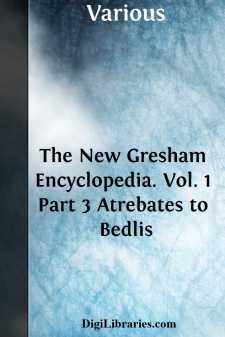Categories
- Antiques & Collectibles 13
- Architecture 36
- Art 48
- Bibles 22
- Biography & Autobiography 813
- Body, Mind & Spirit 142
- Business & Economics 28
- Children's Books 15
- Children's Fiction 12
- Computers 4
- Cooking 94
- Crafts & Hobbies 4
- Drama 346
- Education 46
- Family & Relationships 57
- Fiction 11828
- Games 19
- Gardening 17
- Health & Fitness 34
- History 1377
- House & Home 1
- Humor 147
- Juvenile Fiction 1873
- Juvenile Nonfiction 202
- Language Arts & Disciplines 88
- Law 16
- Literary Collections 686
- Literary Criticism 179
- Mathematics 13
- Medical 41
- Music 40
- Nature 179
- Non-Classifiable 1768
- Performing Arts 7
- Periodicals 1453
- Philosophy 64
- Photography 2
- Poetry 896
- Political Science 203
- Psychology 42
- Reference 154
- Religion 513
- Science 126
- Self-Help 84
- Social Science 81
- Sports & Recreation 34
- Study Aids 3
- Technology & Engineering 59
- Transportation 23
- Travel 463
- True Crime 29
The New Gresham Encyclopedia. Vol. 1 Part 3 Atrebates to Bedlis
by: Various
Description:
Excerpt
VOWELS
ÃÂ, as in fate, or in bare.
ä, as in alms, Fr. âme, Ger. Bahn = á of Indian names.
aÃâ¢, the same sound short or medium, as in Fr. bal, Ger. Mann.
a, as in fat.
a¨, as in fall.
a, obscure, as in rural, similar to u in but, Ãâ in her: common in Indian names.
Ãâ, as in me = i in machine.
e, as in met.
Ãâ, as in her.
ë, as in pine, or as ei in Ger. mein.
i, as in pin, also used for the short sound corresponding to Ãâ, as in French and Italian words.
eu, a long sound as in Fr. jeûne = Ger. long ö, as in Söhne, Göthe (Goethe).
eu, corresponding sound short or medium, as in Fr. peu = Ger. ö short.
à Â, as in note, moan.
o, as in not, soft—that is, short or medium.
ö, as in move, two.
à « as in tube.
u, as in tub: similar to Ãâ and also to a.
u¨, as in bull.
ü, as in Sc. abune = Fr. û as in dû, Ger. ü long as in grün, Bühne.
uÃâ¢, the corresponding short or medium sound, as in Fr. but, Ger. Müller.
oi, as in oil.
ou, as in pound; or as au in Ger. Haus.
Of the consonants, b, d, f, h, j, k, l, m, n, ng, p, sh, t, v, z, always have their common English sounds, when used to transliterate foreign words. The letter c is not used by itself in re-writing for pronunciation, s or k being used instead. The only consonantal symbols, therefore, that require explanation are the following:—
ch is always as in rich.
d, nearly as th in this = Sp. d in Madrid, &c.
g is always hard, as in go.
h represents the guttural in Scotch loch, Ger. nach, also other similar gutturals.
nÃâ¢, Fr. nasal n as in bon.
r represents both English r, and r in foreign words, which is generally much more strongly trilled.
s, always as in so.
th, as th in thin.
th, as th in this.
w always consonantal, as in we.
x = ks, which are used instead.
y always consonantal, as in yea (Fr. ligne would be re-written lÃâny).
zh, as s in pleasure = Fr. j.
Atreb´ates, ancient inhabitants of that part of Gallia Belgica, afterwards called Artois. A colony of them settled in Britain, in a part of Berkshire and Oxfordshire.
At´rek, a river of Asia, forming the boundary between Persia and the Russian Transcaspian territory, and flowing into the Caspian; length 250 miles.
Atreus (at´rà «s), in Greek mythology, a son of Pelops and Hippodamëa, and grandson of TantÃÆlus. Atreus was the father of Agamemnon, according to Homer; other writers call him Agamemnon's grandfather. He succeeded Eurystheus, his father-in-law, as King of MycÃânæ, and in revenge for the seduction of his wife by his brother Thyestes gave a banquet at which the latter partook of the flesh of his own sons. Atreus was killed by Ægisthus, a son of Thyestes. The tragic events connected with this family furnished materials to some of the great Greek dramatists.
Atri (ancient, Hadria), an episcopal city in the province of Teramo, Italy, 8 miles from the Adriatic. It has an old (thirteenth century) Gothic cathedral, ruins of ancient Roman walls and buildings, and a palace of the Agraviva family, who were Dukes of Atri from 1398 to 1775....












